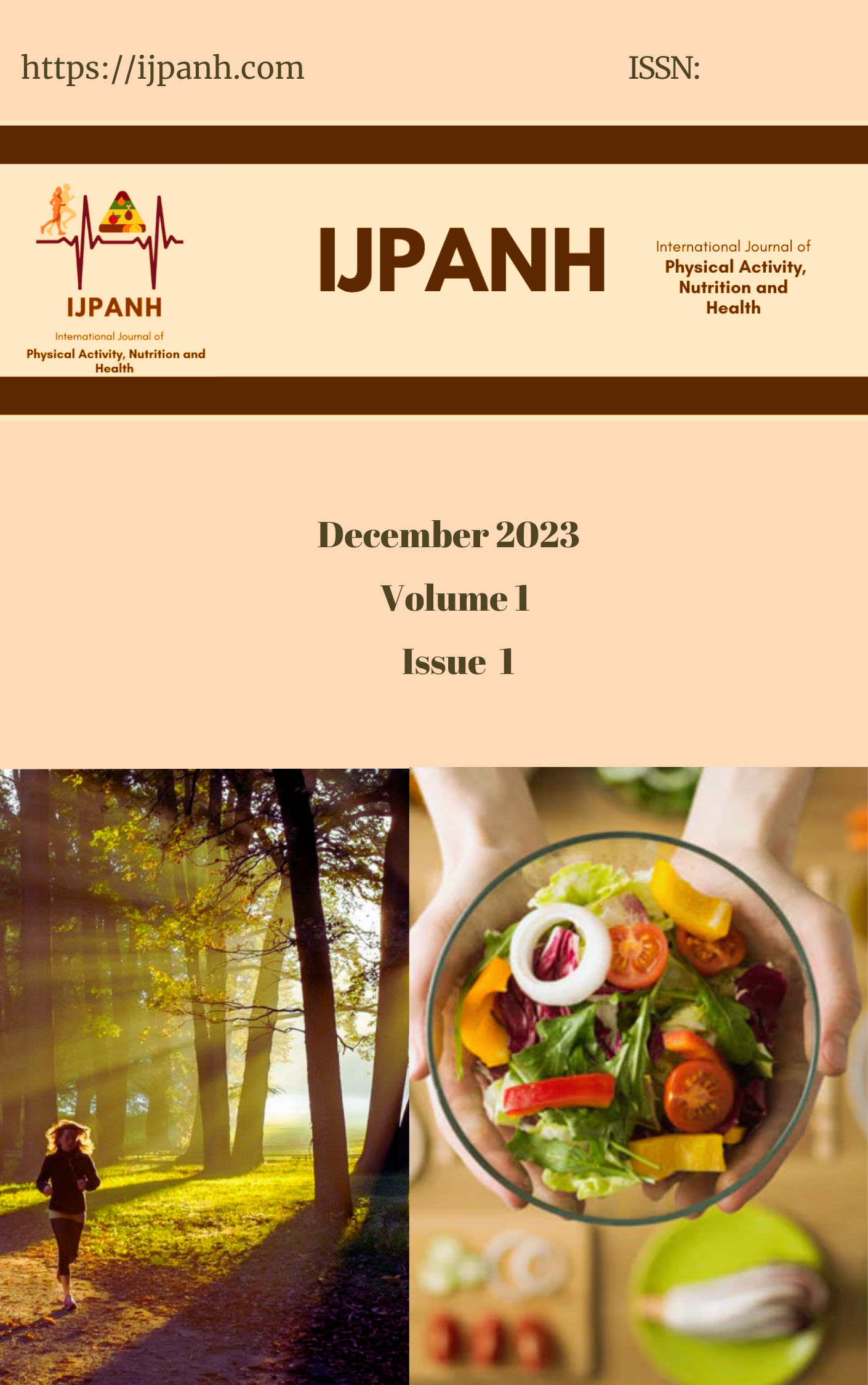Lifelong Fitness Camp: Effects on Anthropometric Characteristics and Obesity Awareness in Obese People
DOI:
https://doi.org/10.5281/zenodo.10447198Keywords:
Obesity, Exercise, AwarenessAbstract
The purpose of this research; To examine the effects of lifelong fitness training on anthropometric measurements and obesity awareness in obese people. 31 individuals (23 women and 8 men) who attended the 'Lifelong Form Camp' in Kocaeli province participated in this research. A multidisciplinary program covering nutrition, exercise and social activities was applied to individuals for varying periods of time (8 weeks-34 weeks) in an environment isolated from environmental conditions. As a data collection tool; Tanita MC 580 device was used for Obesity Awareness Scale and anthropometric measurements. Anthropometric measurements of the individuals were taken before starting the exercise program, and the final test was taken after the program lasted 8-34 weeks. When the percentage change between the individuals' pre-tests and post-tests is examined; body weight (22.33%), body mass index (37.36%), body fat percentage (25.99%), body fat weight (43.11%), body water percentage (-21.85%) and A change in fat-free mass percentage (21.85%) was found. Significant differences were found in all anthropometric characteristics. There was no significant difference in the obesity awareness total score and its subscales. It was determined that female participants had higher scores in the obesity awareness sub-dimension, physical activity sub-dimension and obesity awareness total score, and male participants had higher scores in the nutrition sub-dimension. In our study, in parallel with the literature, obesity rates, body weight, body mass index and body fat ratio of individuals who exercised regularly and had a healthy diet decreased. It can be said that a multidisciplinary program that includes regular exercise and healthy eating habits reduces the risk of obesity.
References
Alasmari, H.D., Al-Shehri, A.D., Aljuaid, T.A., Alzaidi, B.A., ve Alswat, K.A. (2017). Relationship between body mass index and obesity awareness in school students. J Clin Med Res, 9, 520–524.
Allen, A. (2011). Effects of educational intervention on children's knowledge of obesity risk factors. Phd Thesis, Carroll College.
Aslan, N.N. ve Yardımcı, H. (2017). Obezite üzerine etkili yeni bir hormon: İrisin. Gümüşhane Üniversitesi Sağlık Bilimleri Dergisi, 6, 176-183.
Aycan, Z. (2016). Çocukluk çağında obezite ve metabolik sendrom. Türkiye Çocuk Hastalıkları Dergisi, 10(3), 1-3.
Fonseca-Junior, S.J., Bustamante, C.G., Rodrigues, P.A., Oliveira, A.J. ve Fernandes-Filho, J. (2013). Physical exercise and morbid obesity: A systematic review, Arquivos Brasileiros de Cirurgia Digestiva (ABCD), 1, 67-73.
Grave, R.D. (2013). Exercise therapy in adult individuals with obesity, Ed: Dominique Hansen, Chapter:11, Motivating patients with obesity to exercise, New York: Nova.
Gürlek. A, (2005). Modern Tıp Seminerleri:31, Obezite, Ankara: Güneş.
Hankey, C. ve Whelan, K. (2018). Advanced Nutrition and Dietetics in Obesity, Wiley Blackwell.
Horák, S., Sovová, E., Pastucha, D., Konečný, P., Radová, L., ve Calabová, N. (2017) Comprehensive group therapy of obesity and its impact on selected anthropometric and postural parameters. Cent Eur J Public Health, 25, 326-331.
James, W.P.T. (2010). Physical activity and obesity, Chapter 11, Global prevalence of adult obesity, 2nd ed., Ed: Claude Bouchard, Peter t. Katzmarzyk , Unites States: Human Kinetics.
Jeffery, R.W., ve Utter,J. (2003). The changing environment and population obesity in the United States. Obes Res, 11, 12-22.
Kafkas, M., ve Özen, G. (2014). Obezite farkındalık ölçeği’nin (OFÖ) Türkçeye uyarlanması: Bir geçerlik ve güvenirlik çalışması. İnönü Üniversitesi Beden Eğitimi Ve Spor Bilimleri Dergisi, 1(2), 1-15.
Kara, H. (2014). Diyet yapan obez bireylerde leptin, ghrelin, nesfatin1 ve obestatin biyokimyasal parametreleri ile kilo verme arasındaki ilişki, Yüksek lisans tezi, Balıkesir Üniversitesi, Balıkesir.
Ma, J., Yank, V., Xiao, L., Lavori, P.W., Wilson, S.R., ve Rosas, L.G. (2013) Translating the diabetes prevention program lifestyle intervention for weight loss into primary care: a randomized trial. JAMA Intern Med, 173, 113-121.
Ma, J., Rosas, L.G., Lv, N., Xiao, L., Snowden, M.B., ve Venditti, E.M. (2019) Effect of integrated behavioral weight loss treatment and problem-solving therapy on body mass index and depressive symptoms among patients with obesity and depression: The randomized clinical trial. JAMA, 321, 869-879.
Orhan, Y. ve Bozbora, A. (2008). Obezite. İstanbul: Medikal.
Ross, R., ve Janssen, I. (2007). Chapter:11 Physical activity, fitness and obesity. Physical activity and health. Ed: Bouchard, C., Steven, N.B., ve William, L.H. , United States: Human Kinetics
Sayer, R.D., ve Hill, J.O. (2019). Exercise in the treatment of obesity. Chapter: Obesity: Pathogenesis, diagnosis and treatment. Springer International Publishing.
Sbraccia, P. ve Finer, N. (2019). Obesity pathogenesis, diagnosis and treatment. Switzerland: Springer, Chapter:15, Exercise in the Treatment of Obesity.
Süel, E., Yılmaz, G., Yüksel, İ. G., ve Şengür, E. (2022). Obezite farkındalık durumu, beslenme bilgi puanı ve fiziksel aktivite düzeyinin bazı değişkenler bakımından karşılaştırılması. International Journal of Sport Exercise and Training Sciences - IJSETS, 8(4), 214-223.
Şayık, D., Ak, A., Dinibütün-Öğrünç, E., Ermis, S., ve Musmul, A. (2021). Obeziteye multidisipliner yaklaşım: sağlıklı - kalıcı kilo verme ve psikolojik belirtiler üzerine etkileri, Psikiyatride Güncel Yaklaşımlar, 13, 311-323.
Taşan, E. (2005). Obezitenin tanımı, değerlendirme yöntemleri ve epidemiyolojisi. Türkiye Klinikleri Dâhili Tıp Bilimleri Dergisi, 1(37), 1-4.
Tonguralp, Ş.Ş., Köse, B., ve Dönmez, G. (2016). Zayıflama ürünleri gerçekten etkili mi?, Türkiye Klinikleri Spor Hekimliği, 2(3), 66-72.
Tunay, M. (2018). Kadınlarda obezite ve dürtüsellik ilişkisinin değerlendirilmesi, Türk Diyabet ve Obezite Dergisi, 2, 59-64.
Tümer, A., ve Özsoy, S. (2015). The effect of individual counselung intervention based on the stage of change in increasing physical activity. Journal of Ege University Faculty of Nursing, 31 (2),26-39.
Yıldırım, M., Şimşek, B., ve Kartal, A. (2022). Lise öğrencilerinin obezite farkındalık düzeylerinin incelenmesi. Journal Of Social, Humanities and Administrative Sciences, 8(51), 603-611.
Yoldağ, F. (2016) Obez bireylerde yüksek proteinli diyetler ile normal proteinli diyetlerin kilo verme açısından kıyaslanması, Yüksek lisans tezi, Doğu Akdeniz Üniversitesi, Magusa.
Yüksel, E., ve Akıl, M. (2019). Adölesanların fiziksel aktivite seviyeleri ile obezite farkındalık düzeyleri ve beslenme davranışlarının incelenmesi, Niğde Üniversitesi Beden Eğitimi ve Spor Bilimleri Dergisi, 13(3), 185-193.
Zorba, E. (2014). Yaşam Boyu Spor. Ankara: Nobel Yayıncılık.
Downloads
Published
How to Cite
Issue
Section
License
Copyright (c) 2023 IJPANH

This work is licensed under a Creative Commons Attribution 4.0 International License.






